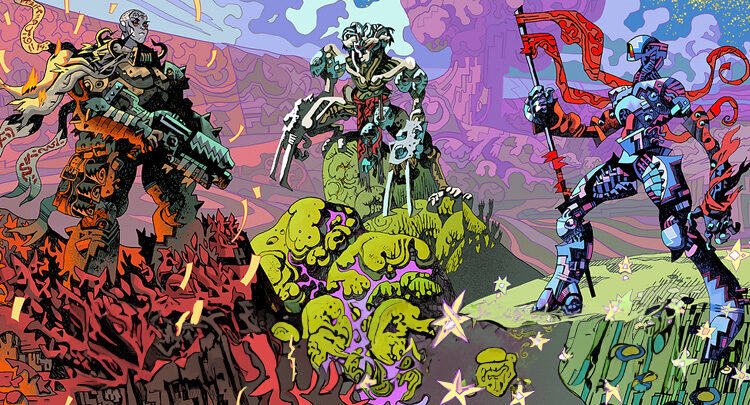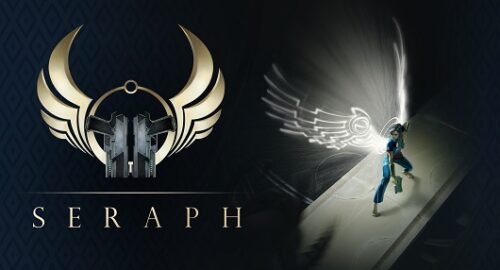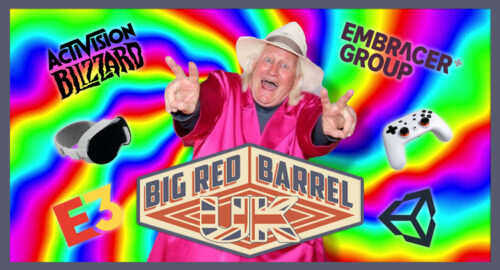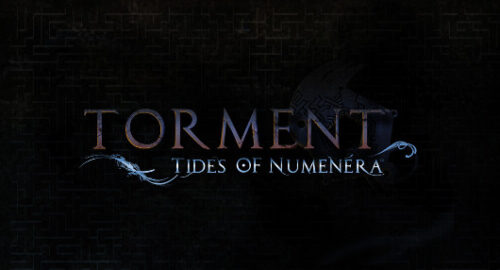Cantana has been in Early Access on Steam since May 2022. It is now heading to a full 1.0 release on 15 August 2023. It is an isometric strategy game with a distinctive striking neon art style. Not being a PC gamer myself, I have not yet played, but as a big fan of turn-based strategy games – and intrigued by the graphical styling, I was keen to learn more.
Fortunately, I was able to corner the developers, Afterschool Studio, and take my turn asking questions – even more fortunately, they took turns providing answers. The resulting clash of ignorance and informed intelligence had the following results.
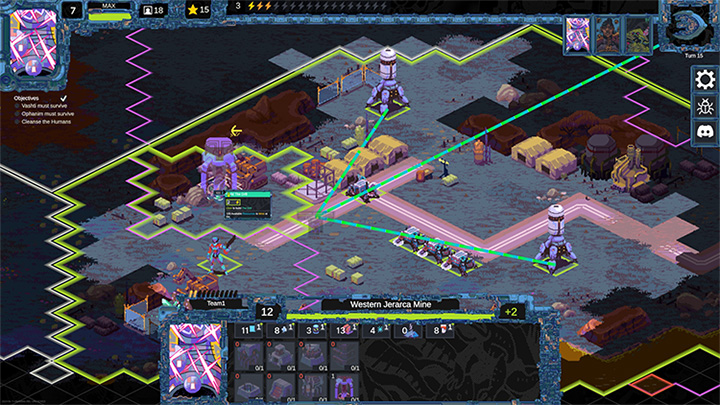
I wanted to know what the main influences were when designing Cantata. I had expected obvious videogame influences such as Advanced Wars or Into the Breach but given my other gaming passions, I was pleased to learn that there were also boardgame influences – especially as they were good and interesting ones to draw from.
Advance Wars was obviously a big [influence], though over time, our references really drifted. We started looking a lot more at boardgames like Twilight Imperium, Root, and Inis. Other games like Civilization, Age of Wonders, and more “standard” 4X games were a reference but we weren’t trying to channel too much of what they do.
We delved deeper into the discussion of influences, particularly regarding the remarkable glowing neon art style.
Our artstyle is a major selling point, and the goal has always been to break out of what people expect from such an otherwise crunchy game. We wanted something that felt exciting and interesting and really pulled you through the game instead of having that sense of “we’ve seen it all before”. To that end we opted for pretty high-resolution pixel art assets, which at the scale of the game (and with the isometric perspective) does feel like it breaks out of traditional 2D art styles.
I asked about the Early Access period – what was learnt from this time and why they chose to develop the game in this way. It seemed that the developers felt that the two-way street of communication at this early stage helped to shape what the game has now become – and from the overall very positive reviews on Steam, their players seem to agree.
What Cantata “is” was really hard to exactly figure out. We had a lot of ideas about how the game could have evolved, but really wanted to make sure we incorporated the community into that development process as soon as possible to help us figure that out. I think if you ask anyone that’s been with us since the start of [Early Access], they’ll tell you we really listen and respond to feedback, and I think the game is so much better for it. It’s substantially changed since that first release, and in large part that’s due to having an open line with the community and what they want and what we want from the game and how to combine both of those things.
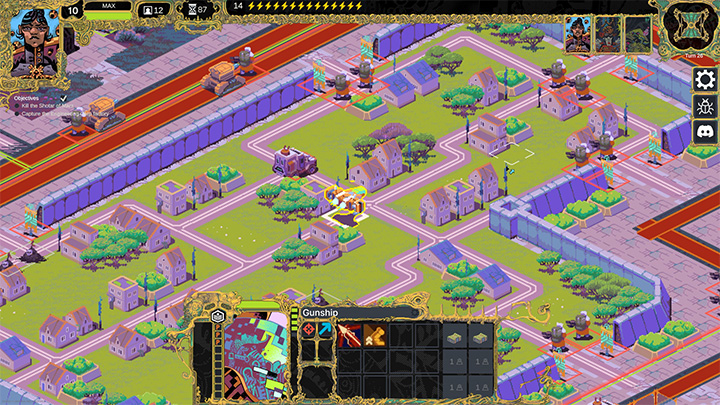
I wanted to find out what a typical turn for a player was like and how this was informed by the overall description of Cantata being described as “Combining elements from Grand Strategy titles with the small-scale skirmishes of classic Tactics games.”
The biggest element is that everything you do feeds directly into action on the map, meaning there isn’t the typical “strategy/tactics” split of a normal grand strategy game. So on a given turn you’re using a shader action pool to build units, build buildings, attack the enemy, scout, build up your infrastructure, etc.
The Steam description of Cantata included the phrase “genre-defining”. I said that seemed a somewhat bold claim and asked what made them confident that this was true.
It is bold! I think it’s because there is really nothing else like it, despite seeming on the surface like a lot of other things. I know games can be “different” and not be genre-defining, but we’ve put a ton of thought into what Cantata is and have landed on this otherwise untapped space that I would love to see more games in – “Grand Tactics”. The closest thing I think is maybe the recently released Dune game by Shiro, but even then that’s a [Real-time strategy].
I was pleased by this answer as I have often said that I have become an increasingly less of a fan of RTS games, as it seems to marginalise strategy in favour of rewarding rapid time management skills.
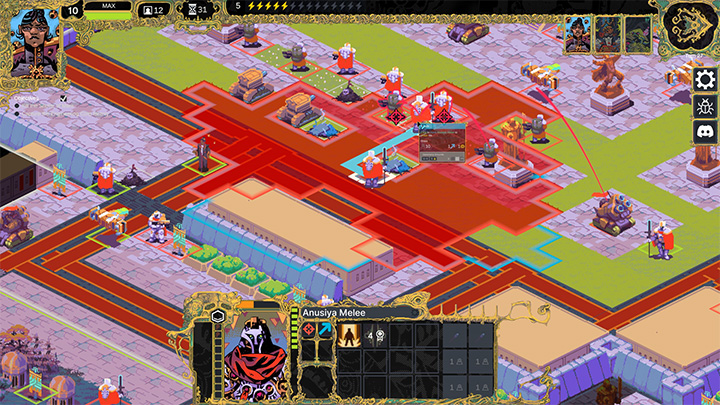
I was keen to dig further into the gameplay. Particularly asking how many units and buildings a player will be in command of.
It’s a bit up to you based on how you like to play, though unit counts can easily be in the range of ~30-60. Buildings vary as well, though likely on the small side with 15-30. It really depends on the map though, some of the later maps are giant battles, which have hundreds of units.
I wanted to find out more about the chapters that had not been seen in the Early Access version. Six chapters had been available to play but there are three more to come.
We’ve really tried to push the game to the limits with each chapter in the campaign to offer something that doesn’t just feel like a different [flavour] of what came before. So in addition to the “standard” chapter things like totally original music, unique units, unique landscapes, you can also expect to see some more non-traditional map designs that are focused on smaller armies, and another map where you explore a city.
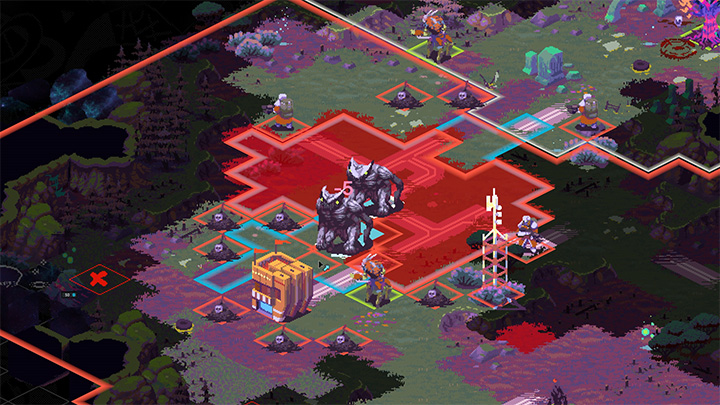
I asked about the factions available in the game and if there are any other factions not yet seen. Three factions are mentioned: Humans, Machines and Aliens.
The planet Shoal is represented on the map with [its] own faction units as well, but those three factions are the main factions in the game.
Enquiring further about the planet Shoal, I wanted to know where in the Universe it was in relation to Earth, as well as checking that Cantata‘s humans originated from Earth.
Yes! We’re in the far future but not on some parallel timeline. The Shotar of the Human faction is “The Shotar of Mars” so we know we are at least “close” in terms of galaxies. If we were to place it in time, we’re probably a couple thousand years into the future, when the first “galaxy spanning empire” is about to encounter its first decline.
As it was of particular importance to me as a solely console gamer, I wanted to know the plans beyond Steam but wondered if any support for mods may make this more difficult.
We built the editor to run inside the game itself, so any platform we publish on will at least have access to the scenario building tools. For more robust modding support like custom units and terrains, those will be on PC only for now, but I hope that we can still provide a path to allow (potential) console players to access those mods, even if we can’t let them directly make them.
This seems like the best case scenario for fellow console gamers.
Cantata has a number of multiplayer options, including Split-screen, LAN and Online Co-op modes. I wanted to know why the developers thought it was important to include all those options.
Cantata is fundamentally a “multiplayer” game – every match sees you playing against opponents that have all the same tools you have access to. Multiplayer was something that just made sense then from both a design and code standpoint. Especially when considering modding, I want Cantata to be the de-facto “tactical multiplayer sandbox game” people return to often to just [try] out different mods and maps together.
A bold aim – but I’m not going to criticise a developer for aiming for the stars.
Afterschool Studio have said that “Campaign maps are largely non-linear, with every map holding secrets to seek out”. I was keen to find out how the non-linear nature of the maps allow for variations in player interactions and what were their favourite secrets that players should make sure they seek out.
The maps have obvious “objectives” that you can accomplish to simply move the story along, but the side objectives and exploration you can do will often give you more insight into the world of the game and also sometimes provide you with benefits in whatever battle you’re currently waging. I highly recommend people seek out the corners of the map! As for my [favourite], I recommend people find “The Merchant” – everyone on the team assumes this is secretly the strongest person on the planet Shoal. But there’s also just so many small moments that are nice to discover and definitely reward repeat playthroughs.
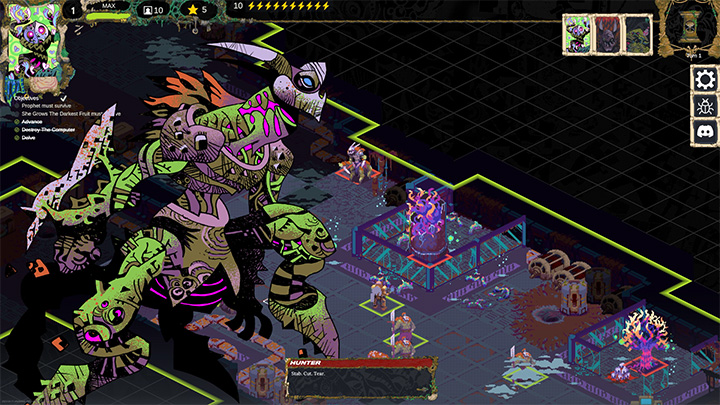
I craved more information and to find out more about the developers, Afterschool Studio, particularly how many people worked on the game and what games they had worked on previously.
At the height of production we were about 12 people, though since then we’ve shrunk a bit to around ~5. Cantata is the first major game we’ve made together, though we’ve all mostly worked on other games independently in the past.
Finally, I enquired what the developers were most excited about ahead of the release on the 15th August.
From the very first idea of Cantata, I’ve wanted the game to be deeply moddable, and I’m excited to say I think we’ve really delivered on that vision and beyond. The scenario editor is incredibly powerful, and with (incoming!) workshop support, I’m excited to watch people turn Cantata into the game they’ve always dreamed of.
